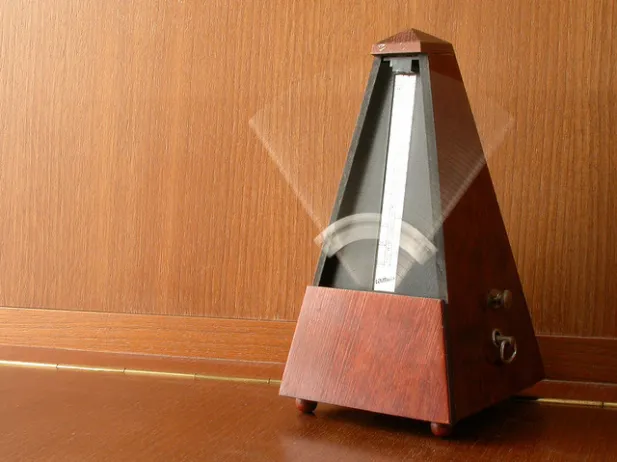Why Smart Songwriters Use Click Tracks
Jan 20, 2014Let me say up front that I want you to make a lot of great music this year. Not only that, but I want you to get more done in less time and have more fun doing it. That’s what this entire Songwriting Month is all about. So take a little tip from me: get smart and start using click tracks when you’re demoing songs.

Via Paco Flickr
Click Tracks Give You Vibe
Let’s just cut to the chase and address the biggest misconception about click tracks (i.e. metronomes) in the studio: they steal the soul and vibe of your song. The most common complaint I hear about click tracks is that they make music sound robotic, static, and it removes any opportunity for vibe and flow. Ironically it’s the opposite.
The point of a click or metronome is to act as a guide or a framework. You know when the quarter notes are, or the eighth notes, or at least the down beats of each measure are. Why is that cool? So you can vibe freely in between. When you know exactly when the next bar is about to hit you are confident, so you can focus more on the vibe and performance than the timing.
The opposite is true when you record without a click. You’re having to listen to so hard and try to keep up with the drums or the other instruments that you become mechanical and stiff. You don’t have the confidence of the tempo that a click would give you so you push and pull trying to keep up.
Oh sure you will ebb and flow in tempo even when playing to a click, but at least you can focus on your instrument and let someone else (someTHING else keep time).
Click Tracks Make Arranging Easy
When record your demo parts to a click track, arranging becomes a snap. As you record more and more parts, you can freely move measures, riffs, and whole verses of a song around all without losing the vibe of the song and with an almost flawless edit. That’s because you can now take advantage of your DAW’s grid mode or snap tools.
If you didn’t record your initial track to a click you are on your own, hoping you didn’t put your bass line or organ track even slightly out of time (which becomes more noticeable as the song progresses).
Click Tracks Make Overdubbing Doable
Let’s be honest, the biggest reason click tracks are helpful is because without them, overdubbing becomes nearly impossible. If you aren’t familiar with what overdubbing is, it’s most likely what you’re doing right now. Recording one part at a time. The alternative to this would be to record the entire band all at once, live. To do this would require more microphones, cables, stands, and preamps. And for some of you it would also require cloning yourself.
The reality is, most of us will record one thing at at time: scratch guitar, drums, bass, guitar, vocals, etc. If you write and record to a click, then each time you overdub you can always count yourself in perfectly and find your place in the vibe and tempo of the song. Clearly it’s not impossible to do this without a click, but it makes things harder and sloppier.
Clicks Reveal A Lot
If I can be candid for a moment, if you’re brand new to using click tracks, you might stink at it. The reason? You’re not as good at keeping time in your head as you thought. You’ll swear that the click is slowing down at times. But rest assured the click is perfect, you were just pushing the tempo (because that’s what we do when we get to loud fun parts!)
Playing to a click takes practice, but only because we aren’t as good as we think. And that’s helpful. It makes you a better musician. And honestly once you get the hang of it, you stop noticing the click. And another funny thing happens. Your recordings start to sound a lot tighter and more professional. What a concept!
Start With Your Demo
So as you wrap up writing songs and you’re moving into a demo phase (maybe you’re laying down the scratch vocals and guitar), fire open your DAW, select a tempo that feels comfortable, create a click track, and then lay down those parts to the grid. You don’t have play like a robot, just play along with the click. The rest of your recording process will thank you for this.
Discover The 6 Steps for Creating a
Radio-Ready Song from Scratch"
Enter Your Email Below To Receive The Free 17-page PDF,
"6 Steps To A Radio-Ready Song"
We hate SPAM. We will never sell your information, for any reason.

